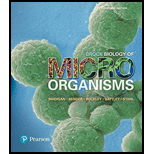
Brock Biology of Microorganisms Plus Mastering Microbiology with Pearson eText -- Access Card Package (15th Edition)
15th Edition
ISBN: 9780134268668
Author: MADIGAN
Publisher: PEARSON
expand_more
expand_more
format_list_bulleted
Concept explainers
Question
Chapter 11.4, Problem 1CR
Summary Introduction
The genome consists of all essential information required for the survival of the organism. Genes are composed of DNA containing instructions either for coding a specific protein or to perform a specific function. Heritable modification in the
Expert Solution & Answer
Want to see the full answer?
Check out a sample textbook solution
Students have asked these similar questions
Explain how a mutagen can interfere with DNA replication to cause a mutation. Give two examples.
How does a mutagen induce mutation ?explain with examples?
Name the two types of mutagens, give an example for each, and briefly describe how they cause mutations.
Mutagen:
Example:
Description:
Mutagen:
Example:
Description:
Chapter 11 Solutions
Brock Biology of Microorganisms Plus Mastering Microbiology with Pearson eText -- Access Card Package (15th Edition)
Ch. 11.1 - Distinguish between a mutation and a mutant.Ch. 11.1 - Distinguish between screening and selection.Ch. 11.1 - Prob. 3MQCh. 11.1 - Write a one-sentence definition of the term...Ch. 11.2 - Do missense mutations occur in genes encoding...Ch. 11.2 - Why do frameshift mutations generally have more...Ch. 11.2 - Prob. 1CRCh. 11.3 - Why are suppressor tRNA mutations not lethal?Ch. 11.3 - Which class of mutation, missense or nonsense, is...Ch. 11.3 - What is the difference between same-site and...
Ch. 11.4 - Prob. 1MQCh. 11.4 - Prob. 2MQCh. 11.4 - Prob. 1CRCh. 11.5 - Which protein, found in virtually all cells,...Ch. 11.5 - Explain the fate of transferred chromosomal DNA if...Ch. 11.5 - Prob. 3MQCh. 11.5 - What are heteroduplex regions of DNA and what...Ch. 11.6 - During transformation a cell usually incorporates...Ch. 11.6 - In genetic transformation, what is meant by the...Ch. 11.6 - QExplain why recipient cells do not successfully...Ch. 11.7 - Prob. 1MQCh. 11.7 - What is the major difference between generalized...Ch. 11.7 - Why is phage conversion considered beneficial to...Ch. 11.7 - QExplain how a generalized transducing particle...Ch. 11.8 - In conjugation, how are donor and recipient cells...Ch. 11.8 - Explain how rolling circle DNA replication allows...Ch. 11.8 - QWhat is a sex pilus and which cell type, F or F+,...Ch. 11.9 - In conjugation involving the F plasmid of...Ch. 11.9 - Prob. 2MQCh. 11.9 - Prob. 3MQCh. 11.9 - QWhat is a merodiploid and how does an F plasmid...Ch. 11.10 - Why is it usually more difficult to select...Ch. 11.10 - Why do penicillins not kill species of Archaea?Ch. 11.10 - Explain one type of conjugation in Archaea and how...Ch. 11.11 - Prob. 1MQCh. 11.11 - What is the significance of the terminal inverted...Ch. 11.11 - How can transposons be used in bacterial genetics?Ch. 11.11 - Prob. 1CRCh. 11.12 - Why is the CRISPR system considered a prokaryotic...Ch. 11.12 - Prob. 2MQCh. 11.12 - QExplain why incoming DNA recognized by a short...Ch. 11 - A constitutive mutant is a strain that...Ch. 11 - Although a large number of mutagenic chemicals are...Ch. 11 - Why is it difficult in a single experiment to...Ch. 11 - Prob. 4AQ
Knowledge Booster
Learn more about
Need a deep-dive on the concept behind this application? Look no further. Learn more about this topic, biology and related others by exploring similar questions and additional content below.Similar questions
- Distinguish between chemical and physical mutagens, and provide examples.arrow_forwardFill the Table with mutagenic agents and provide their type (physical, chemical, biological) and their classification based on their effect (teratogenic, carcinogenic, clastogenic, or non-specific), together with their modes of action. Mutagen Type of Mutagen Classification based on effect Action Cobalt Nickel Methylhydrazine Temozolomide Ethyl ethane sulfatearrow_forward
arrow_back_ios
arrow_forward_ios
Recommended textbooks for you
 Human Heredity: Principles and Issues (MindTap Co...BiologyISBN:9781305251052Author:Michael CummingsPublisher:Cengage Learning
Human Heredity: Principles and Issues (MindTap Co...BiologyISBN:9781305251052Author:Michael CummingsPublisher:Cengage Learning

Human Heredity: Principles and Issues (MindTap Co...
Biology
ISBN:9781305251052
Author:Michael Cummings
Publisher:Cengage Learning
Mitochondrial mutations; Author: Useful Genetics;https://www.youtube.com/watch?v=GvgXe-3RJeU;License: CC-BY